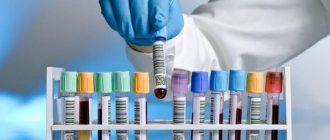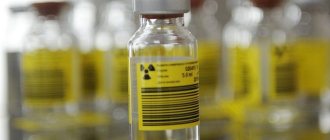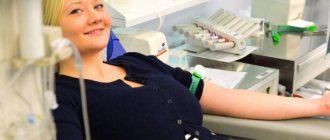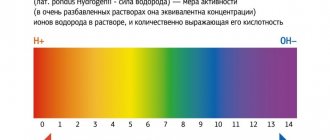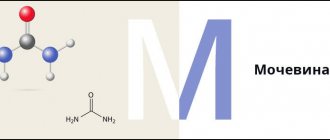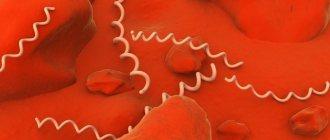T3 free, Triiodothyronine free, Free Triiodthyronine, FT3
Triiodothyronine is the main thyroid (iodinated) hormone of the thyroid gland, which in its free form is responsible for the process of saturating cells with oxygen and energy. Biologically active T3 is involved in metabolism and clearly demonstrates the condition and functional suitability of the thyroid gland.
Free T3 analysis allows you to determine abnormalities in the functioning of the endocrine system and timely diagnose critical conditions (thyrotoxicosis, thyroiditis), etc.
What is the T3 hormone responsible for?
T3 hormone is a thyroid hormone and is the more active of the two main hormones. You can find another name for it – triiodothyronine. The presence of the number three in the definition of a hormone is explained by the fact that each of its molecules contains exactly that amount of iodine.
T3 is formed as a result of the breakdown of another hormone - T4, when one iodine atom is split off from it. The process that occurs after the splitting of an atom can be compared to the process of removing the pin from a grenade. The transformed, previously sedentary T4, having transformed into triiodoitrine, becomes very active.
Its purpose is to control the energy metabolic processes occurring in the human body. The hormone influences the breakdown of energy and sends it to where it is needed. Once in the bloodstream into the cells of the child’s brain, the hormone promotes its rapid development. Thanks to the work of triiodothyronine, nerve conduction is enhanced in an adult.
Triiodothyronine is important for the cardiac system and bone tissue, as it helps activate metabolism in them. General nervous excitability increases under the influence of triiodothyronine.
- Signs of elevated T3 levels
- Difficulties in conducting analysis
Effect of triiodothyronine on the body
Regulation of mitochondrial function is one of the most important functions of T3
The task of this biologically active substance is to control the level of metabolism and energy.
Its action is multifaceted:
- absorption of carbohydrates;
- lipid breakdown;
- regulation of mitochondria;
- participation in the production of vitamin A;
- adjustment of mineral metabolism;
- stimulation of children's intellectual development;
- maintaining normal human body temperature;
- improving memory and performance in adults;
- increasing the passage of signals along nerve fibers;
- prevention of the development of atherosclerotic changes;
- synthesis of proteins, ribonucleic and deoxyribonucleic acids.
In addition, T3 regulates energy conversion and the transport of energy-rich compounds to those cells that need them.
T3 hormone is free and total - what is the difference?
A certain amount of triiodothyronine can be produced by gland cells in an already “ready” state, that is, with 3 iodine atoms. Once in the bloodstream, it communicates with transporter protein molecules. The hormone is transported through the vessels to the tissues that need it. But a small amount of triiodothyronine remains in the blood, unbound to protein molecules. This triiodothyronine is called “free T3 hormone.”
The hormone that remains free in combination with the one that is bound to proteins is defined as the total hormone T3. It is its quantity that is often indicative of questionable results of tests for free hormone, which are carried out to determine thyroid dysfunction in humans.
[Video] Doctor MD Mikhail Yurievich Bolgov, a surgeon of the highest category, will explain the difference between the total and free hormone T3. The features of its action and use in diseases of the thyroid gland are highlighted:
Which one to take - general or free?
The doctor decides which test is best. You can get a referral for it from a therapist, pediatrician or endocrinologist. The form will necessarily indicate the type of hormone.
Donating blood to check the level of free T3 is necessary for diseases of the thyroid gland, or to determine the effectiveness of hormonal therapy. An assessment of total T3 levels is required when diagnosing hypothyroidism or thyrotoxicosis. However, the best option is to take both tests.
Functions of triiodothyronine
- Provides cellular “respiration” of tissues and organs;
- Participates in general metabolism (metabolism);
- Responsible for rhythm and heart rate;
- Activates regeneration processes (cell renewal);
- Regulates nervous excitability;
- Stimulates the synthesis of vitamin A;
- Reduces the concentration of “bad” cholesterol in the blood serum.
TK is responsible for energy metabolism, i.e. promotes the extraction of energy from food and its further rational use.
Also, this hormone takes an active part in the “correct” formation of internal organs and systems in the physical development of the embryo. Therefore, T3 levels are very important to monitor in women planning to conceive and pregnant women.
But basically, a general analysis of T3 (bound by transporter proteins) makes it possible to diagnose disorders in the endocrine system and pathology of the thyroid gland itself.
T3 hormone test
When determining pathological conditions of the thyroid gland, the endocrinologist necessarily sends the patient to take tests for three hormones - T4, TSH, T3. Testing for the latter type of hormone is extremely important, as it allows minimizing diagnostic error.
For example, with nodular toxic goiter, very often independently working nodes are engaged in the reproduction of the T3 hormone. Its amount also increases in diffuse toxic goiter, Graves' disease and Graves' disease. If the analysis produces a result that shows a significant increase in triiodothyronine, then doctors talk about T3 toxicosis. This condition is difficult to correct with drugs and manifests itself with more vivid symptoms than those found with an increase in the amount of the T4 hormone.
Norm of T3 hormone
The norm of total hormone T3:
| Age | Norm in Nmol/l | Norm in ng/dl | Norm in ng/ml |
| 4 months | 1,23 — 4,22 | 80 — 275 | 0,80 — 2,75 |
| 4 months - 1 year | 1,32 — 4,07 | 86 — 265 | 0,86 — 2,65 |
| 17 years | 1,42 — 3,80 | 92 — 247 | 0,92 — 2,47 |
| 7 – 12 years | 1,43 — 3,55 | 93 — 231 | 0,93 — 2,31 |
| 12 – 20 years | 1,40 -3,34 | 91 — 217 | 0,91 — 2,17 |
| 20-50 years | 1,2 — 3,1 | 78 — 201 | 0,78 — 2,01 |
| 50 years | 0.62 to 2.79 | 40 — 181 | 0,40 — 1,81 |
To convert total T3 from nmol/L to ng/mL, multiply the number by 0.651: (nmol/L) x 0.651 = ng/mL.
To convert ng/ml to nmol/l, multiply the number by 1.536: (ng/ml) x 1.536 = nmol/l.
The norm of free hormone T3:
| Age | Floor | Norm in pmol/l | Norm in pg/ml |
| In the first year | Both | 3,5 – 7, 35 | 2,28 – 7,78 |
| 1 – 12 years | 4,1 – 6,5 | 2,67 – 4,23 | |
| 12 – 16 years old | Man | 4,3 – 6,8 | 2,8 – 4,43 |
| Woman | 3,7 – 6,3 | 2,4 – 4,1 | |
| 16 – 18 years old | Man | 3,4 – 6,2 | 2,21 – 4,04 |
| Woman | 3,7 – 5,7 | 2,4 – 3,71 | |
| 18 years | Both | 2,5 – 5,7 | 1,63 – 3,71 |
If the values on your form are indicated in pg/ml, then simply multiply them by 1.536: (pg/ml) x1.536 = pmol/l. To convert the numbers the other way around: (pmol/l) x0.651 = pg/ml.
It must be said that these standards may differ from those that you receive in the laboratory. The fact is that, depending on what equipment the hormone test is performed on, the normal values will vary. Each specific laboratory makes a choice in favor of one or another apparatus and set of reagents. Therefore, the quantity will be considered normal if the results obtained fall within the reference limits indicated on a specific form from a particular laboratory.
How to take it correctly
Blood for analysis is taken from a vein. Depending on the symptoms, the doctor identifies a group of hormones that need to be tested. It is advisable to completely limit physical and psycho-emotional stress for 12 hours, not to drink alcohol, medications or food containing iodine.
Particular attention is required in preparation for donating blood samples for representatives of the fair half - it should be carried out during a certain period of the menstrual cycle, which is designated by the doctor. The donation procedure itself, as a rule, is scheduled for the morning hours, on an empty stomach.
What does elevated T3 hormone mean?
Free T3 increases if a person has problems with the thyroid gland. The most common of them:
- Multinodular or diffuse toxic goiter develops with isolated T3 toxicosis. Without treatment, the levels of all thyroid hormones will increase, but in the early stages of these diseases, only T3 increases, and T4 remains normal.
- Inflammation of the thyroid gland caused by autoimmune diseases, infection or childbirth.
- Thyroid cancer. Tumors are capable of producing substances similar in structure to hormones, so T3 levels will be increased.
- Endemic goiter caused by iodine deficiency. The proliferation of thyroid tissue provokes an increase in T3 levels.
- Pendred's disease. This is a congenital disease associated with genetic disorders. It gives several symptoms, one of which is an enlarged thyroid gland and hyperthyroidism.
- Resistance to thyroid hormones.
An increase in T3 levels can be caused by nephrotic syndrome, choriocarcinoma, myeloma, and hemodialysis.
In older people, the level of the T3 hormone may be reduced due to existing diseases of the internal organs. In this case, the values of the T4 hormone will remain within normal limits. In this case, the changes detected in the analysis do not indicate damage to the thyroid gland.
Signs of elevated T3 levels
Due to the fact that T3 is an extremely active hormone, its increase in the blood causes a number of very pronounced symptoms:
- The patient becomes overly irritable, nervous, quickly becomes enraged and excited. Against this background, the patient is constantly haunted by fatigue. Doctors sometimes refer to this set of symptoms as irritable weakness;
- Tremor of the fingers on the upper extremities is another common sign of increased triiodothyronine;
- The patient's pulse quickens, symptoms of tachycardia are observed, and disturbances in the heart rhythm occur. Extrasystole is a symptom of increased hormone. This condition is characterized by an increase in the number of heart contractions with a long period of rest. A person feels these disturbances and often complains to the doctor about “interruptions” in the functioning of the heart;
- Loss of body weight is often noted.
Antibodies
Many patients want to clarify: why does the analysis of thyroid hormones contain information not only about the hormones themselves, but also about some unknown antibodies? Why does a doctor need information about the so-called AT-TPO and AT-TG?
The fact is that an increase in the concentration of the antibodies presented indicates the presence of certain autoimmune processes in the gland. Such an analysis is not performed without indications: it is prescribed if the fact of autoimmune pathology has already been proven.
For the patient, changes in antibody levels are, in principle, unlikely to be informative. After all, the increase in the level of AT-TPO and AT-TG is not considered individually, but in combination with other indicative changes. Thus, an increase in their content against the background of a normal TSH value does not indicate the presence of pathology.
Diseases leading to a decrease in the T3 hormone
A decrease in triiodothyronine levels is observed when the production of all hormones produced by the thyroid gland is disrupted. This condition occurs in serious diseases:
- There is such a disease - Hashimoto's thyroiditis, when a person's own immunity begins to destroy some of the cells of the thyroid gland. These cells cannot be restored and in most cases cease to function and produce hormones forever.
- Hypothyroidism. This condition often develops while taking certain drugs used to treat diffuse and nodular toxic goiter. Potentially dangerous drugs include thyreostatics such as: Propicil, Tyrosol, Mercazolil.
- Triiodothyronine levels may be reduced when surgery has been performed to remove either the entire thyroid gland or a specific part of it.
- The level of T3 decreases while a person undergoes treatment with radioactive iodine. Such therapy is carried out when it is necessary to rid the patient of diffuse toxic goiter.
- A drop in hormone production is observed when taking medications containing significant amounts of iodine. Among these are cordarone, amiodarone and others.
It is worth knowing that hormones do not decrease in a chaotic manner. The level of the T4 hormone always drops first and only after that the normal value of triiodothyronine decreases. This condition is caused by the activity of the body. When the T3 hormone drops, it tries to hedge its bets and, as it were, transfers “cash into freely convertible currency,” because triiodothyronine is almost 10 times more active than T4. Doctors call this activity of the body an increase in the peripheral conversion of T4 to triiodothyronine. Thanks to this process, the effects of hypothyroidism are not as severe as they could be. Knowing this, you can independently suspect a laboratory error. If the analysis shows that the level of triiodothyronine is reduced (and it does not matter what hormone it is - total or free), but TSH and T4 remain within normal limits, then you should double-check the data obtained and donate blood for hormones again.
After all, thyroid hormone deficiency is a serious pathology. A disease in which the function of the thyroid gland decreases is fraught with the development of processes such as drowsiness, weight gain, deterioration of thought processes and speech, and disruptions in the menstrual cycle in women. If the disease is severe, cretinism is often observed in childhood, and adults suffer from myxedema. However, peripheral conversion of hormones allows you to avoid these manifestations if treatment was started in a timely manner.
Contraindications and restrictions
Factors influencing research results
A decrease in the concentration of triiodothyronine is facilitated by the use of amiodarone, anabolic steroids, androgens, dexamethasone, propranolol, salicylates, coumarin derivatives, antithyroid drugs, aspirin, atenolol, carbamazepine, cimetidine, furosemide, lithium preparations, theophylline. An increase in triiodothyronine concentration can be caused by taking estrogens, contraceptives, methadone, amiodarone (rarely), clofibrate, tamoxifen, phenothiazines, terbutaline, valproic acid, lithium preparations, antithyroid drugs, rifampicin. Falsely elevated values of triiodothyronine can be observed during pregnancy, myeloma, and also in severe liver diseases (due to an increase in the concentration of thyroxine-binding globulin in the blood plasma).
How to prepare for the analysis?
Blood is taken to determine hormone levels in the morning, on an empty stomach. However, the patient is allowed to drink sweetened water.
If the patient has undergone surgery on the thyroid gland, is taking medications, or has recently completed a course of radiotherapy, then blood for the T3 hormone is taken no earlier than 14 days later.
To obtain an accurate result, you need to stop taking medications for 2 days. In particular, oral contraceptives can distort the data.
Difficulties in conducting analysis
Carrying out an analysis to detect the level of triiodothyronine is considered a rather complex procedure. Errors often occur in laboratories. You can think about these on your own if an additional test was carried out to identify the level of other thyroid hormones - TSH and T4. If the results obtained show that TSH is normal and the T3 hormone is elevated, then most likely an error has occurred. The unreliability of the analysis can also be judged on the basis of an increase in T3 and TSH, but normal T4 values. If such results were obtained, then it makes sense to double-check the data. This is due to the fact that when T3 increases, the TSH level decreases and T4 increases.
If the tests were carried out qualitatively and the results clearly indicate an increase in triiodothyronine, it is necessary to consult an endocrinologist.
